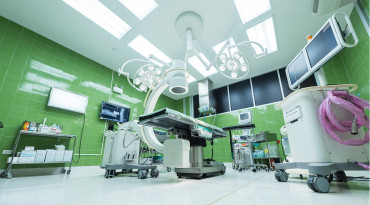Why Do Hospital-Acquired Infections Occur?

Contracting an infection while in the hospital isn’t an uncommon occurrence, and some surgical procedures may make the chances of infection even higher. However, in many cases, hospital-acquired infections are preventable when medical staff follows the guidelines for cleanliness. When a hospital-acquired infection (HAI) is caused by a doctor or other medical professional being negligent or not adhering to the guidelines, they could be held liable for the injuries a patient suffered.
What Kinds Of Infections Can You Get In The Hospital?
A hospital-acquired infection is an infection that you develop while in the hospital that is not related to your original illness, injury, or diagnosis. It typically develops within 48 hours of being admitted to the hospital, and it can be very serious, even life-threatening.
HAIs can occur in various ways. Typically, they happen when invasive medical devices are used for treatment or surgery. If these medical devices are contaminated or not sterilized correctly, dangerous bacteria, viruses, or fungi can be introduced into the body. Some of the different kinds of HAIs that occur in the hospital include:
- Surgical site infections
- Catheter-related urinary tract infections
- Ventilator-related pneumonia
- Central line-related bloodstream infections
What Is the Most Common Type Of Hospital-Acquired Infection?
The most common type of hospital-acquired infections usually come from contaminated medical devices (ventilators, catheters, IVs). They account for nearly two-thirds of all HAIs. Other HAIs include infections that develop following surgery, clostridium difficile colitis (also called C. diff), which affects the gastrointestinal system, and methicillin-resistant Staphylococcus aureus (MRSA), which is an antibiotic-resistant staph infection.
If any HAI is left untreated, it can result in the patient developing sepsis. Sepsis is a complication of an infection in which there is a poisoning of the bloodstream. It can progress quickly, so it must be treated as a medical emergency, or it can lead to death.
How Are Infections Acquired In A Hospital And Who Is Liable?
Typically, infections are acquired in a hospital in three ways. These ways are often defined as specific risk factors, including patient risk factors, facility risk factors, and iatrogenic risk factors.
Patient risk factors – These risk factors include the length of a patient’s stay in the hospital, the overall condition of the patient’s immune system, and the severity of the patient’s injury or illness. All of these factors can affect the chances of developing an HAI.
Facility risk factors – These risk factors include the cleanliness of the hospital, including the sterility of medical devices, cleanliness of building surfaces, concentration of patient beds, cleanliness of water supply systems, and effective filtration of the HVAC system. When any of these factors are not properly maintained, HAIs can result.
Iatrogenic risk factors – These factors include the actions of doctors, nurses, and other hospital staff as they treat and interact with patients. This consists of how often and how well they wash their hands, the administration of antibiotics, and the care used when invasive procedures are performed like intubation, catheterization, and administering medications intravenously.
If there is medical negligence involved in an HAI case, it may be difficult to trace it back to the responsible party. When that cannot be done, the hospital itself is likely to be held liable. Hospitals have policies and procedures regarding sanitation in place to help keep patients safe from the bacteria and germs present in the facility. Protocols include things like how to keep surgical incisions clean, changing bedding regularly, sterilizing surgical tools, and more. Suppose it can be proven that the hospital or a hospital employee failed to adhere to safety protocols, either intentionally or not and that those actions (or inactions) caused an HAI in a patient. In that case, the hospital may be found liable for the patient’s damages.
What Should You Do If You Developed An HAI In The Hospital?
If you or a loved one developed an HAI during or shortly after a stay in the hospital, you might be a victim of medical malpractice. Medical malpractice claims, including those involving hospital-acquired infections, are often complicated and can be difficult to prove. For that reason, you must have an experienced medical malpractice attorney representing you in the case.
At Ross Feller Casey, our medical malpractice attorneys are the legal authority in hospital-acquired infection cases. They have an unmatched record of winning cases for clients who have suffered injuries resulting from HAIs, and they are ready to do the same for you. We also have a team of top physicians right on staff, three of whom are also attorneys.
Let Ross Feller Casey help you with your medical malpractice claim. Contact our office today to schedule your free case review. One of our attorneys will help you determine the best way to proceed with your case. We handle medical malpractice cases on a contingency basis, so there is no cost to you until there is a financial recovery.
Disclaimer: Ross Feller Casey, LLP provides legal advice only after an attorney-client relationship is formed. Our website is an introduction to the firm and does not create a relationship between our attorneys and clients. An attorney-client relationship is formed only after a written agreement is signed by the client and the firm. Because every case is unique, the description of awards and summary of cases successfully handled are not intended to imply or guarantee that same success in other cases. Ross Feller Casey, LLP represents catastrophically injured persons and their families in injury and wrongful death cases, providing legal representation in Pennsylvania and New Jersey.





